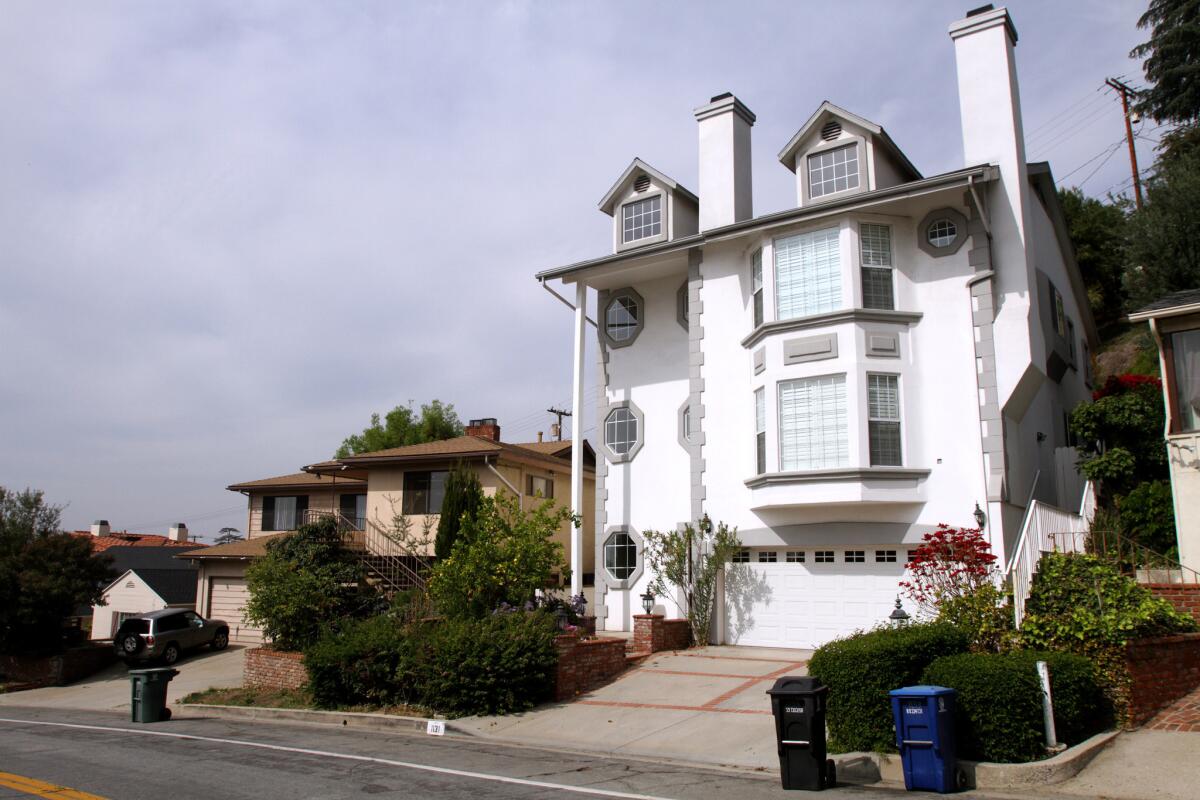Potential sober-living facility in Burbank neighborhood alarms some residents

Neighbors have voiced concerns about the planned use of the house at 1131 E. Tujunga Avenue as a sober-living facility.
- Share via
An effort to redefine housing terms in Burbank’s city code — including a controversial piece that allows unlicensed group homes, including possible sober-living facilities, in single-family residential neighborhoods — has “lain dormant” for many months, a city official said this week.
The news came after nearly a dozen residents of the Burbank neighborhood that includes the 1100 block of East Tujunga Avenue spoke Tuesday during a City Council meeting, voicing concerns that the owner of a piece of property on that block could bring drug and alcohol addicts, and their dealers, into the area.
NEWSLETTER: Stay up to date with what’s going on in your neighborhood >>
They said that they learned the owner is a Rancho Cucamonga-based real estate holding company that establishes small group homes, which may include sober-living facilities, in single-family residences. Some speakers held fliers that quoted some descriptions of the company, Main Pulze Inc., in language from its own materials.
The company claims to buy properties and convert them to “mini skilled nursing facilities for profit” as well as facilities providing “residential care for the elderly, the developmentally disabled, and intensive inpatient/outpatient drug and alcohol rehabilitation.”
It seeks to take advantage of a market opportunity for small, intensive state-licensed facilities, according to its materials.
The flier claims that while “it is not known what type of rehab facility is proposed,” the multistory Burbank home would be unsuitable for serving the elderly and disabled and would likely be a drug and alcohol rehabilitation facility.
Representatives of Main Pulze Inc. did not return multiple calls seeking information about their project.
Sharon Springer, a resident of the neighborhood who also works for a nonprofit that provides programs at senior apartment communities, said in an email Friday that she had spoken to a Main Pulze representative and put together the flier with another area resident, Ed Zolian, to provide “factual and non-alarmist” information.
But residents said they were alarmed to learn of the new neighbor and were concerned about the dangerous element a rehab facility could introduce into what Zolian called a “so-called safe neighborhood.” They also complained about potential parking impacts, traffic and decreased property values.
Their comments echoed concerns raised in January 2014, when dozens of residents protested a council vote to approve a state-required housing element to allow community care facilities, which may include sober-living facilities that don’t require licensing, in single-family residential neighborhoods.
At the time, officials said there were at least three sober-living facilities in Burbank that didn’t require licenses, but just one in a single-family residential zone. However, Burbank Police Capt. Mike Albanese said, at the time, that calls to local sober-living facilities were “surprisingly low” — just two in two years to the one in a single-family zone.
While Burbank officials disagreed with state housing officials who said the law required Burbank to allow group homes in all residential zones, they said they were limited in regulating such facilities, citing a Newport Beach ordinance restricting homes for recovering alcoholics and drug addicts, which was struck down by a federal appeals court.
After adopting the housing element two years ago, the city had three years to implement the policy document through council-approved ordinances that would be consistent with state laws defining housing-related terms. This week, in response to the renewed public outcry, Mayor Bob Frutos asked for an update on that matter.
“The housing definitions became the kiss of death,” said Carol Barrett, the city’s assistant director of community development, during a City Council meeting this week.
The city had hired an outside attorney, Barbara Kautz, who specializes in land-use law and had done community outreach to residents and housing providers about the issue and had brought an ordinance to the City Council for a first reading in June 2014.
However, state housing officials raised concerns that sent the city “back to the drawing board,” Barrett said Friday.
Then, the staff members assigned to work on the issue — there would be four — began resigning during a period in which several city planning staff members left for opportunities in other cities. And then, for a while, there was no one to work on it. However, Barrett said the city is ready once again to move forward with the work.
“We’ve reengaged Barbara Kautz,” Barrett said, and a community meeting on the issue is scheduled for 6:30 p.m. on March 24 in room 104 of the Community Services Building, 150 N. Third St.
Barrett said that even if the work to revise the definitions had been completed, it likely wouldn’t have prevented Main Pulze from setting up a facility on Tujunga Avenue. She said a second phase of the city’s effort involves looking into what the city can legally do to regulate group homes, short of what Newport Beach attempted.
--
Chad Garland, chad.garland@latimes.com
Twitter: @chadgarland
--
ALSO:
Operation Firefly shines a light on night-time bicycle safety
A sisterhood between Girl Scouts is forged by cookies and a lost Hello Kitty purse
